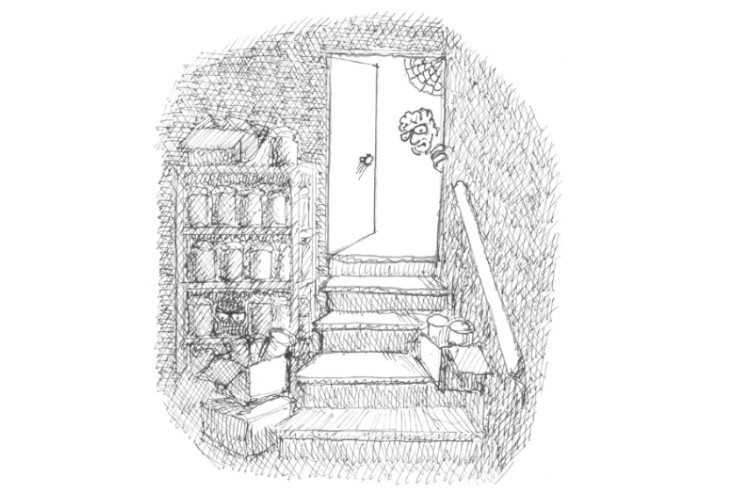
Composting mistakes happen. Some of those mistakes are pretty minor, like when you spill your cup of freshly squeezed rosemary lemonade into the compost pile on a hot summer day. It’s disappointing, for sure, but it won’t ruin your compost.
Other composting mistakes, while certainly not the end of the world, can still smell like it’s the end of the world. These mistakes aren’t very fun, but again, they’re fixable. Usually you just need to add some brown to your brown and green mix, or maybe give your compost pile a good stir.
What’s rare is when these mistakes lead to something delightfully delicious. A friend once had a pumpkin patch growing from his compost heap. One of the pumpkins must have been 100 pounds. It was truly something to behold!
Something similar happened to Mike McGrath. In The Plant That Was Held Prisoner, Mike shares his experience with vegetables growing from his compost bin. In his case, however, Mike didn’t have a pumpkin patch. In fact, there was only one plant amid a mess of weeds so thick that it had lifted the compost bin off the ground.
Even so, Mike not only found the plant, but it was one of his favorite vegetables! Life was good! At least, it was good until he discovered that the plant was, as you can guess from the title of the story, Held Prisoner!
How does this happen? What happens next? I’ll let Mike tell the story.
Composting Mistakes Can Be Messy. They Can Also Leave Us With Some Fun Stories.
This story comes from our archive that spans over 30 years and includes more than 130 magazine issues of GreenPrints. I love pieces like these that turn stories into comical moments of laughter, and I hope you enjoy this story as well.

The Plant That Was Held Prisoner
By a Compost Bin.
By Mike McGrath

Before I get to this week’s Exciting Episode, I have to brag about my tomatoes. Almost everyone I spoke with said that this past year’s tomato harvest was awful. Mine was so good I had to go down into the basement (OK—it’s a cellar. {OK—it’s much worse than a cellar; in fact it’s SO bad that the guys on the “American Pickers” TV show would say, “We don’t care what you have down there; we’re not going!”}) to find (and wash 16 times) more Mason jars than I have needed in decades.
Make that 17 washings. (The Pickers were right …)
Anyway—this was not supposed to be The Year of the Tomato. It was supposed to be (and also was) The Year of the Pepper. I had absolutely fallen in love with a bag of fresh ‘mini-peppers’ from the supermarket over that winter. Old-school Christmas-light-sized sweet little bells—an equal mix of orange, red, and yellow—that were sweet as candy. So I saved the (abundant!) seeds from two colors each and started them inside in February, which is much too early, but I was bored. And, true, it was February (“Look, honey—black ice!”), but peppers started a month early are only two inches taller than sane ones, while tomatoes started five days too early are three feet tall and tendrilling their way to the timers to give them more light.
[Note to Editor Pat: Yes, “tendrilling” is a real word. Because I said so.]
I also started some hot peppers I got from my crazy pal David T. at J. L. Hudson Seeds (I’ll just call him David T. because his actual last name is so long it would cause this story to be “continued next issue”). My only pepper regret was that I couldn’t locate seeds of “Ordono,” my favorite pepper of all time. The baby peppers start out light green, turn a porcelain white, then yellow, then orange, then red, then deep red; and the best part is that they’re shaped EXACTLY like Old School C-7 goyish Christmas lights! The heck with LEDs—you do some selective picking and you get a non-electric Christmas tree! (And they are hot!)
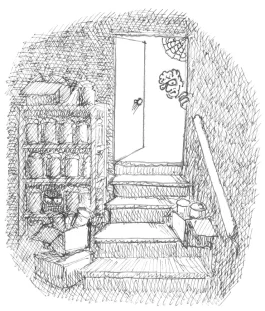
But I digress.
And besides digressions, indiscretions, and assorted and unrelated aggressions, I had way too many pepper plants started, which left little room for the tomatoes that I MUST GROW … because … because … well, because they’re tomatoes, OK? The Gateway Drug of Edible Gardening! We all start with tomatoes, and then it’s one long sad downhill slide into parsnips and God-Knows-What after that.
So I had no room to start extra tomato plants this past year—just enough to put out three plants each of four different varieties; a minimum so bare it would have been banned in Boston!
Then, as most of you know, we had The Hottest Summer in History, which meant getting up early to work in the garden be-fore that full sun hits you like a phaser on stun, and then retreating meekly into the house when you start to hear other Star-Trekian* sounds in the background.
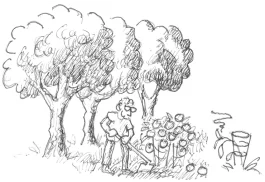
It wasn’t until I had already canned up three runs of sauce by mid-August that I began to notice the grumbles of other growers. “You’ve got lots of tomatoes?! I don’t have any yet—and you barely have opposable thumbs!” (I would have taken physical offense at this had I been able to grasp an object to throw at them …)
Then I realized why one day. Back when I was helping out a local farmer who had gone down for the count in July, “getting up early” meant driving there in the dark. And it was only five miles away. Back at home it meant being up at the crack of eight—which typically gave me three hours of shade in most of the garden …
… which meant that my tomatoes (and peppers, and parsnips {in your dreams, parsnip-head!}) weren’t getting sun until around 11 a.m., which “the book” (and your knuckle-dragging correspondent) would proclaim much too late in the day to get good fruits. (Not to mention that it’s a Union sun out here that knocks off and goes out back to sit on the deck around five …)
Technically not enough sun for tomatoes. Realistically not enough sun for tomatoes. And if you’re keeping score at home, that’s: NOT ENOUGH SUN FOR TOMATOES!
And yet, thanks to Climate Change, Global Warming, or whatever else pushed our AC bill over the top last summer, it protected the tomatoes from being scorched like everyone else’s. So there: Cheaters Always Win.
The peppers were also a constant, and I had to invent new ways to try and eat every one: I made little whole wheat pizzas with six layers of peppers on the top, pepper omelets with sixteen little peppers to each egg; and still I was giving away mounds of peppers to everyone I knew.
The weeds also thrived (isn’t that the name of a book? It should be …), and by mid-summer I noticed that the big recycled black plastic compost bins at the back of the garden were hosting Triffid conventions: creeping Charlie, creeping Jenny, Rondo Hatton as The Creeper—they was all there. It wasn’t bad on some of them, but one that was made in Nova Scotia and had a lot of cut-outs for air-flow at the bottom was going down fast.
This particular black plastic bin (I like this style because they have locking lids that slow the raccoons down for about 30 extra seconds when I mix my kitchen waste into them) has a history. A dear friend of mine used to run the greenhouses at the University of Pennsylvania and throw lavish holiday parties, the best part of which is that she didn’t drink—so there was more for the rest of us. (OK—“the rest of us” means “ME.” You happy now?!)
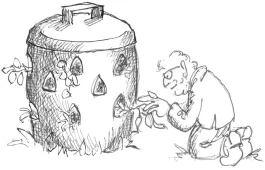
One day we meet up and she talks me into going to this composting seminar with her because she gets a free bin out of attending. I had not been drinking (yet) but was, in retrospect, incredibly pestiferous—yes, even for me.
Composting Instructor: “You can include grass clippings …“
Pestiferous One: “Not if they’re from an herbicide treated lawn!”
“… Ahem; shredded newspaper and junk mail …”
“Oh yeah—LOTS of garden nutrition in there!”
“… A-Hem; fall leaves …”
“What—you’re shredding credit card offers and the weekly world news, but not your leaves?!”
I was given a free bin and asked to leave. And it was neat once I set it up; it had these intricate openings for airflow on the sides—like pre-Raphaelite etchings mixed with Frank Lloyd Wright window designs. Anyway, the creepers were now on them six times sideways, covering the bottom of the bin two feet off the ground. I was tempted to let this go on until I could no longer find the bin, but suspected that there might be really good compost inside, so I yanked and I yanked and I yanked some more …
… and then realized that a “good plant” also seemed to be growing right through one of these little ornamental windows—the business end outside, but the roots firmly inside the bin. I carefully considered all my options and then yanked the whole blasted bin out of the ground. (Had I had thumbs, perhaps things would have gone differently …)
I carried it to the patio, the pepper half in and half out of the window. Luckily, the soft finished compost at the bottom had insured that all the pepper roots were intact, so now I’m Dr. Kildare, working with tiny scissors, trying to cut away just enough of this plastic archway to get the {blessed**} thing out without destroying the bin. If only I had thumbs!
But out it finally came, and it got planted in a pot and brought indoors with the rest of my peppers in September—the difference being that the all-summer-long plants were huge and this was just a baby that had probably sprouted from some wayward seed (another good book title!).
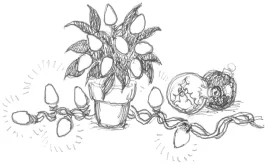
As always, I rushed in the pepper plants; and as always, aphids played Charles Darwin until I was down to a couple of big ones and The Prisoner of The Bin, which was finally flowering.
Around Thanksgiving, the little peppers were starting to look … familiar.
And for Christmas? Yes, I got Ordono.
Why are my best successes accidents? And where ARE my thumbs???!!! ❖
*Another real word. Honest.
**Not my actual word.
By Mike McGrath, published originally in 2017, in GreenPrints Issue #109. Illustrated by Marilynne Roach

What kind of composting mistakes have you made that worked out in your favor?



